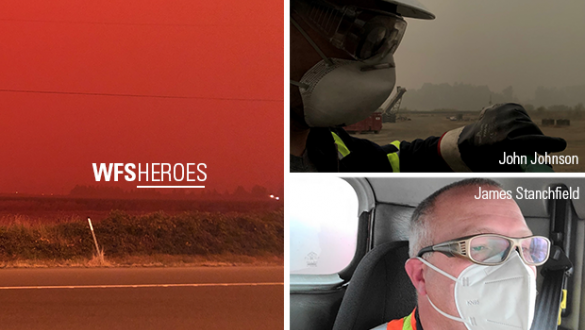What is it like to work at World Fuel Services?
We get things done. We create value for our business partners, enable people around us, and adapt to changing dynamics. Most importantly, we collaborate as one global team.
Forbes awards World Fuel Services one of America’s 500 Best Midsize Employers

Forbes magazine surveyed over 50,000 companies and participants were asked how likely they were to refer World Fuel Services as an employer or business provider and how well World Fuel Services handled the COVID-19 pandemic. World Fuel Services was voted in the top 50 amongst the 500 best midsize employers and we are truly honored by this recognition. We are grateful for the efforts of each of our teammates who helped serve our internal and external customers throughout this unprecedented time.

Our delivery and dispatch teams in the Pacific Northwest U.S. are rising to the challenge in support of customers as deadly wildfires continue in the region. This exceptionally challenging environment combines low visibility, shifting traffic patterns, and extremely poor breathing conditions. “Day looks like night,” is how driver James Stanchfield describes it. “But I feel a responsibility to deliver. We enjoy doing our job and we do it,” he added. One estimate compared breathing in this type of air quality as the equivalent of smoking two packs of cigarettes. According to U.S. government standards, safe air quality levels must have particles below 300 parts per million (ppm). During the last few weeks, levels in this area have regularly risen to more than 500 ppm. In addition, some of our employees live in so-called “Level 2” zones, meaning that they are only one “level” away from mandatory evacuation orders. So, our teams are balancing their commitment to their job with their personal responsibilities to prepare for a possible evacuation so they can protect their families and homes. “As I’m driving, I’m seeing people with all of their belongings – literally, their whole life – packed up on the roofs of their cars, heading in my direction,” said lead driver, Alex Celorio. “And we’re driving towards the fires, to keep our essential customers fueled and ready to go.” “Our West Coast teams are working hard to keep our customers operating during these extremely difficult wildfire situations. It’s inspiring to see that level of commitment,” said David Porria, Portland Terminal Manager. “Every day, these drivers amaze me.” From keeping the City of Portland, Oregon fueled so first responders can do the same, to setting a fuel tank at a wildfire site in Bonney Lake, Washington for Pierce County Emergency Fire, our West Coast team is truly embodying what it means to be there when it matters most.

As one of the first nations in Europe to be seriously impacted by the COVID-19 pandemic, Italy had to mitigate the effects of the crisis early on. As domestic and international air travel came to a halt and the country moved into lockdown, most airports in Italy closed. But our local teams – on the ground at airports in Sardinia and Sicily – maintained operations to provide essential aviation fuel supply to those who needed it most. We are proud to have delivered uninterrupted operations, 24 / 7, from early March on. In fact, we were the only service provider active at three airports, Olbia (OLB), Catania (CTA), and Alghero (AHO), throughout the crisis. Our team including Antonio Usai, Paolo Deriu, and Salvatore Rizza provided into-plane fuel supply for emergency aircraft, including medevac helicopters to support front line emergency and medical workers. We also created new procedures to ensure 100% contactless operations to adhere to social distancing guidelines while maintaining our strict standards for accuracy and safety. “Fuel tickets issued after fueling higher-risk customers (emergency medical service helicopters, for example), which are traditionally hand-written and signed, were digitized to keep essential personnel more safe – a process that has been replicated and is now commonplace at many other airports,” said Francesco Pristerà, WFS Italy operations manager. “We also reduced staff to just one operator to eliminate all unnecessary person-to-person interactions.” As a result of our teams’ hard work, we were recognized by the Ministry of the Interior, Department of the Fire Brigade, Public Aid and Civil Defense Provincial Command.

The pandemic has changed the way we live and work in so many ways. For many on our team, that’s meant working from home. But for a critical group of front-line workers, it hasn’t. These dedicated men and women are continuing to deliver the fuel and energy products that our customers rely on. Even in this unusual environment, they’re committed to do their job, safely and efficiently, so our customers can continue to do what they do best. They are our true #WFSHeroes.
Recently, we were asked to help haul hand sanitizer, instead of fuel. And our team made it happen. Heritage Distillery made the decision to adapt their operations to produce hand sanitizer, to support first responders on the front lines. But they needed help to get it to hospitals and nursing homes where it was needed most.
Our colleagues at the Washington Trucking Association asked if we could jump in to support them. Safety Manager, Taryn Olson; Head of Dispatch, Ben Upchurch; and Market Manager, Kaleb Hoffer worked directly with Heritage Distillery to plan the routes, schedule the drivers, and route the trucks they needed. Our team served as an essential part of this critical medical supply chain – delivering the hand sanitizer to area distribution centers. It was an honor to partner with Heritage Distillery to help make a difference.
“This is a great example of how our team goes above and beyond,” said Jim Pederson, general manager, West region. “Kaleb, Ben, and Taryn gladly took on additional work – beyond their day jobs – to help the COVID-19 response effort. That’s truly what we stand for.”



